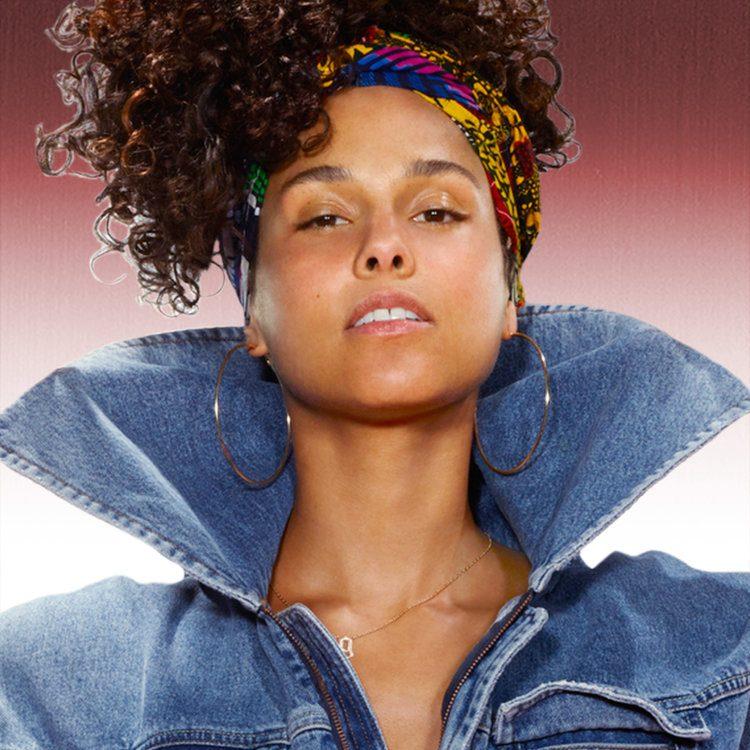
I am sure I am not alone when I say that I rarely leave the house without at least a bit of makeup. I’ve been wearing makeup since I was in 8th grade. I am conditioned to think I need it to look good, to present my best face forward. But maybe that conditioning isn’t necessarily always a good thing. Singer-songwriter Alicia Keys doesn’t seem to think so. She recently appeared on the television show "The Voice" without makeup.
It is a bold move for any celebrity, but it's particularly bold when you consider that last season "The Voice" had over 13 million viewers. She also appeared with little to no makeup on the BET Awards in June. Self Magazine reported that “rosy lip balm seemed to be the extent of her cosmetics.” Keys also appeared without makeup on several magazine covers.
Keys described how she came to be photographed makeup-free for her album cover in an essay for Lenny Letter. She had come from the gym with a “scarf under my baseball cap” and wearing a sweatshirt. The photographer insisted on photographing her right then. Keys' reaction was shock, and she became "a bit nervous and slightly uncomfortable” because her face was “totally raw.” Being photographed without a stitch of makeup proved to be empowering for her. “And I swear it is the strongest, most empowered, most free, and most honestly beautiful that I have ever felt,” she wrote. “I felt powerful because my initial intentions realized themselves. My desire to listen to myself, to tear down the walls I built over all those years, to be full of purpose, and to be myself!”
Beauty-related pressure is a real thing for most women. Dove conducted global research on how women see themselves and what they found is that only 4 percent of women globally consider themselves beautiful, while only 11 percent of girls are comfortable describing themselves as beautiful. Dove also found that most girls (72 percent) feel “tremendous pressure to be beautiful,” while most women (80 percent) agree that “every woman has something about her that is beautiful, but do not see their own beauty." And over half of women agreed that, when it comes to their appearance, they are their own worst critic.
Where does all the pressure to always look good come from? It partly comes from the advertisement industry. In a 2010 study, researchers looked at the “self-activation effect of ads” or the effect ads have on a person’s self-concept. They conducted three experiments and found that “ads can exert self-evaluative effects on consumers.” We see ourselves differently after having viewed certain ads.
The ReThink Beauty Campaign fights against unhealthy media images, particularly body images. The campaign points out that models in ads are “airbrushed and photo-shopped to produce an unattainable image of beauty -- and women around the world strive to fit into it.” And even celebrities are not immune. As the campaign put it, celebrities “brutally suffer because they are heavily scrutinized if they stray from this standard.” Or, as Keys wrote in her essay: “We all get to a point in our lives (especially girls) where we try to be perfect.”
It is because of the intense pressure we all feel as women to look a certain way that it is especially brave for a celebrity like Keys to dare to appear in public without makeup. And it doesn’t get more public than national television. Keys has also taken to posting makeup-free photos of herself on Instagram with the hashtag #NoMakeup. She noticed that other women have done the same and hopes, “It’s a revolution.”
Let’s all hope that it is a revolution and one that changes our perception of beauty. A study published this summer found that physically attractive people have higher incomes than average individuals. “Grooming accounts for the entire attractiveness premium for women, and only half of the premium for men,” the researchers also found. Or in other words, women have to spend time putting on lots of makeup to be considered attractive.
If the no-makeup trend really starts to catch on with more celebrities, a true revolution just might happen. And then our sense of what constitutes attractiveness will change.
Image credit: NBC

Gina-Marie is a freelance writer and journalist armed with a degree in journalism, and a passion for social justice, including the environment and sustainability. She writes for various websites, and has made the 75+ Environmentalists to Follow list by Mashable.com.














